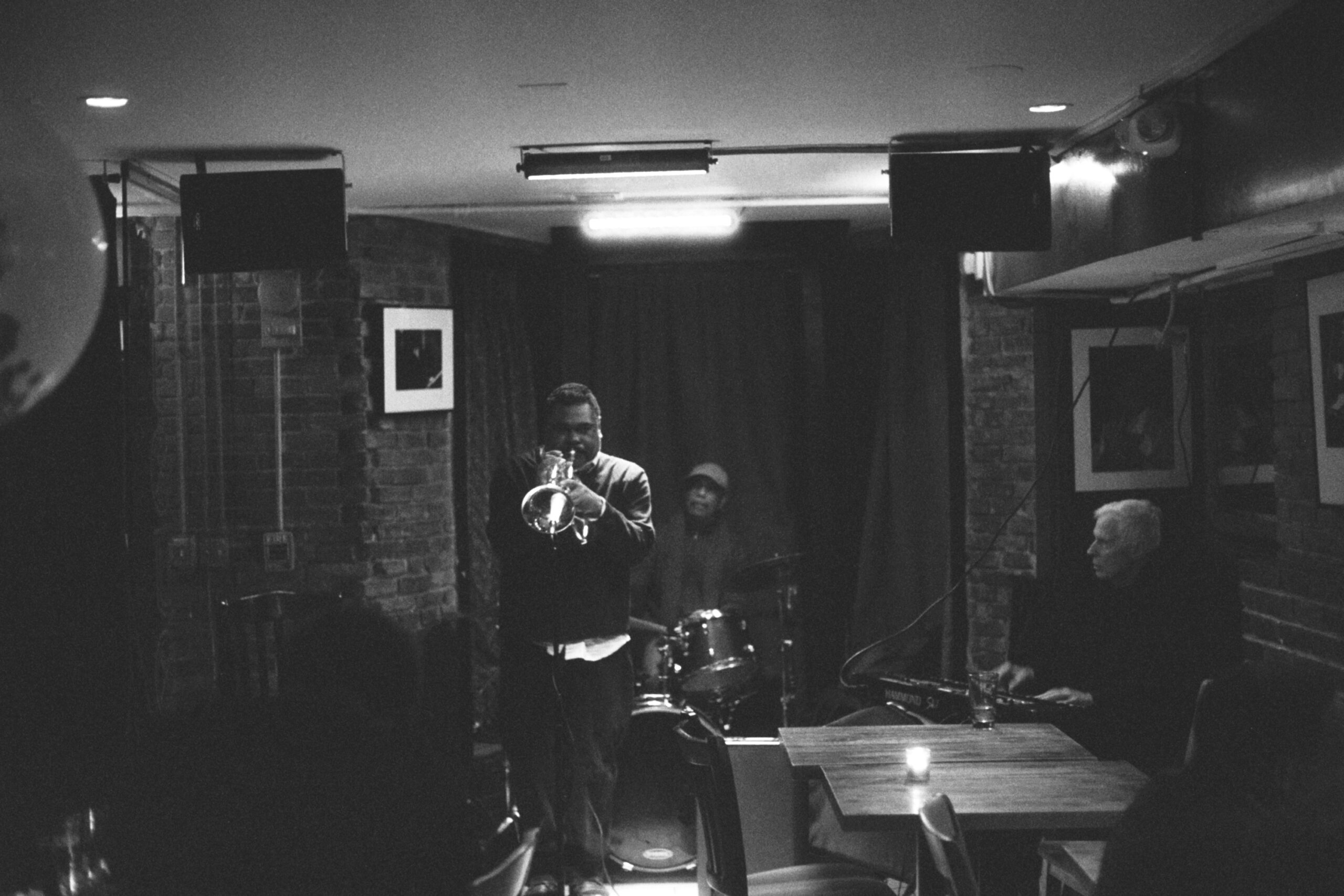Donvonte McCoy Trio
JoJo Restaurant & Bar
Thursday, Jan. 23, 2025
In the middle of a spate of icy January weather, I found my way out of the cold on a recent Thursday and into a packed JoJo Restaurant & Bar, to check out the Donvonte McCoy Trio. I arrived during the first set to discover that I really should have made a reservation. No worries. After waiting out the end of the set, which concluded with a sizzling blues, I moved during the break to a seat at the bar. Now I was perfectly placed to bear witness to the man who is arguably D.C.’s most versatile trumpeter, doing what he does best in a small-group context.
A D.C. native, McCoy has been impressing audiences here and beyond since the 1990s, when he first joined the band of the legendary Lionel Hampton and moved to New York to study at the New School. Since his return to D.C. in the early 2000s, music degree in hand, he has been one of the most respected — if also the most low-key — bandleaders around town. For nearly 20 years, he led bands every Friday and Saturday night on the top floor of Eighteenth Street Lounge, entertaining dancers and close listeners alike with an adventurous mashup of funk, jazz, go-go and other strains of Black musical genius — even before that kind of 21st-century fusion became commonplace in the jazz world of today. Since ESL closed, McCoy has been harder to track down, so his recent appearance at JoJo was well worth seeking out.
Joined by veterans Lenny Robinson on drums and Bill Heid on electric organ, McCoy held the club’s attention and sparked the audience’s enthusiasm with a confidently executed set of new and familiar jazz compositions, which all soared on the strength of the assembled mastery. McCoy is a boss on both trumpet and flugelhorn and is an expert at presenting this music in its fullest historical authenticity while at the same time dangling his sound enticingly before young audiences who might be in search of a no-gym-shoes, no-jeans night of sophisticated fun.

The trumpet, with its cylindrical bore, forces sound into sharp, piercing shapes, while its close cousin the flugelhorn has a conical throat that pushes out a tone that is comparably more like velvet. That night at JoJo, McCoy seemed to want to play more of the latter than the former. His buttery lines on flugel were delivered with a fluidity that never compromised articulation and helped sustain an intimacy that quickly dissolved any distance between his trio and the boisterously engaged audience.
It is perhaps surprising that an artist who garnered so much of his musicianship at the Duke Ellington School of the Arts and at Howard University – where he studied with the legendary trumpeter Donald Byrd – and has become such a respected figure among D.C.’s musicians’ community still keeps a relatively low profile around town. This is not for lack of organic connection, laboriously built between a musician and their base, which McCoy has been putting in the work towards for years. In residency at Eighteenth Street Lounge in the 2000s and 2010s, he shaped a legendary weekly series that cultivated a young audience thanks to an approach to the music that was never too cerebral to keep from turning listeners into dancers. The revolving, hard-pumping ensembles he led there helped develop and launch a number of jazz musicians who are still delighting listeners, some well beyond the area.

The scene at ESL didn’t survive Covid, but JoJo lives on, now entering its third decade of presenting jazz on U Street. Bassist Mike Bowie sets up their live calendar, and with Lenny Robinson as something of a house drummer, the restaurant has become a neighborhood watering hole where local artists can build their brand in front of a diverse audience of discriminating listeners. Mixologist Abdul Kayoumy – former owner of the latter-day Velvet Lounge and Dodge City – pours from a well-stocked bar where the signature drink is the very sweet, but not too strong, Jungle Inn. Chef and co-owner Ben Kibour is famous for his lamb chops and crab-stuffed salmon (wrote the vegan), and the crowd generally seems equally engrossed in their fine-dining and musical experiences.
McCoy knows how to center his performance on that audience, and in the middle of the second set, he humorously “rapped” his way into a version of Joe Zawinul’s “Mercy, Mercy, Mercy” (made famous by Cannonball Adderley). The pentatonic head of the 1966 radio classic, from an era when jazz was still basically a part of popular culture, took me on a memory dive into early childhood, but before I could get lost in my private time warp, McCoy the showman, without breaking the groove, had taken the mic to address a large table of (is it still okay to say, wrote the child of the ‘60s) very attractive young women celebrating a birthday. The guest of honor is named Nelly, and McCoy goads the audience into singing “Happy Birthday” to her (the old classic, not Stevie’s Black version).

There is something about improvising on a tune everyone knows that can bring out the lion in a musician. Over the audience’s natal serenade, McCoy delivered some of his most blisteringly inventive playing. Genius, actually: If you’re going to get your avant-garde ideas across to a mainstream audience, it can be best to wrap them in something sweetly anodyne. Organist Heid capped off the dedication with a cluster of campy, yet brilliant, let’s call them game show chords and then while we were still laughing, a quick rhythmic turn around by Robinson led the group back to “Mercy’s” emotionally stirring, gospelized theme.
I have not said enough yet about the rest of the trio’s contribution. Heid, a Pittsburgh native, has been around D.C. for some years and has become the area’s first-call organ specialist. His playing provided the music’s low-end foundation and also gave the performance a much wider harmonic gamut than I would have expected from a trio. Robinson is from Philly (a city that has spawned a consequential musician or two), and his work never sagged, gluing everything together in a way that gave you the impression that this group has been playing together for years, though these three have in fact barely played together as a trio.
McCoy is a player and bandleader with the vision to silence any critical voices still wondering after the theoretical death of jazz. He builds a living music that is invested in its listeners, and you will be hearing more fine jazz – classical and danceable – from this committed artist.
As I headed back into the arctic air, I could taste something poignant in the lingering flavor of the group’s take on Adderley. Mercy – from the stinging cold, from the political fuckery, from the looming danger of distant wars. Right about now, who wouldn’t welcome a bit of relief? Our future is cloaked in uncertainty, but chances are this bleeding world will still be crying for mercy a year from now, and with certainty we will find it in the music, if nowhere else. You can count on the tireless Donvonte McCoy, horn in hand, to be right in the thick of it.








Join the Conversation →